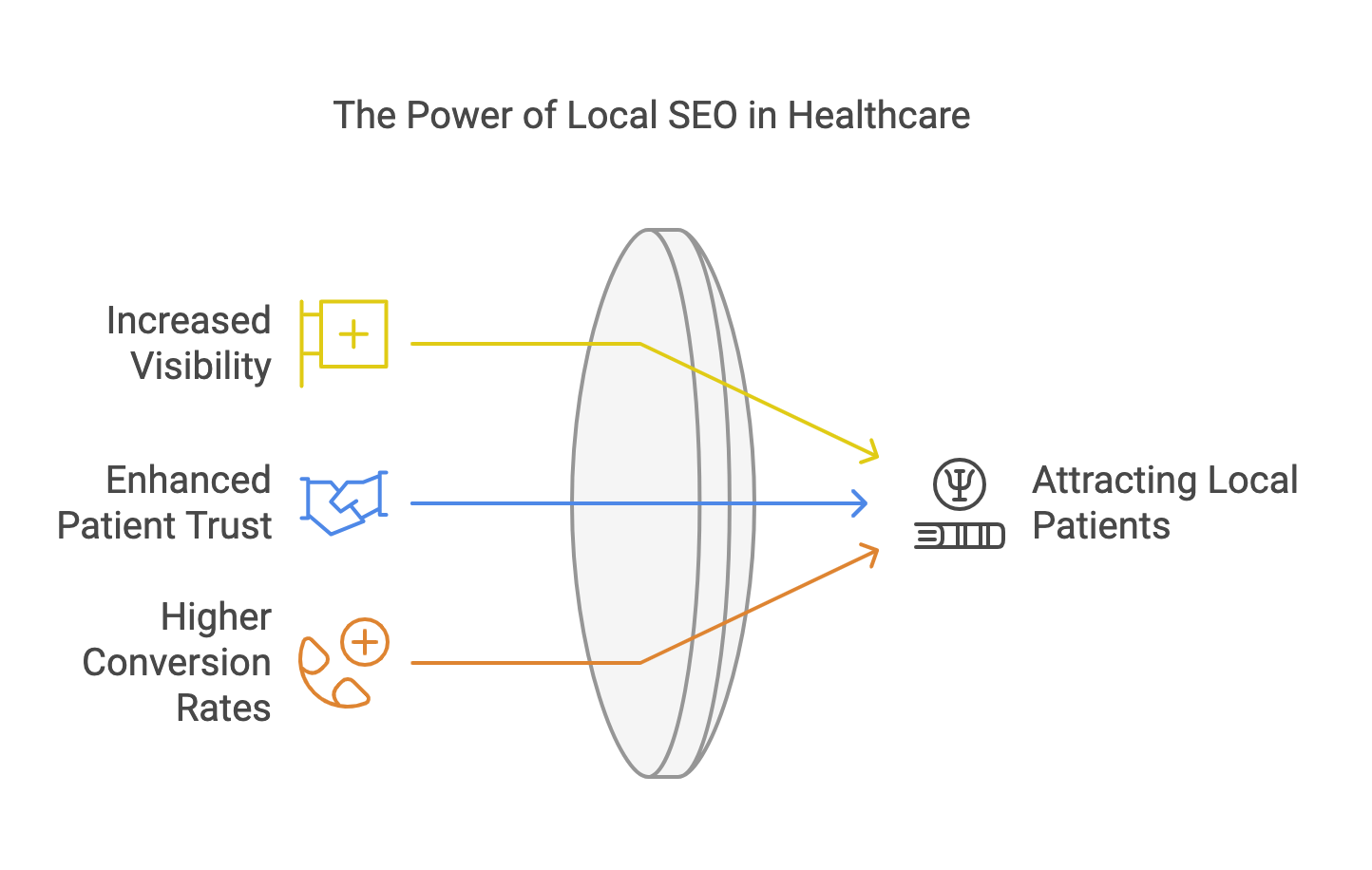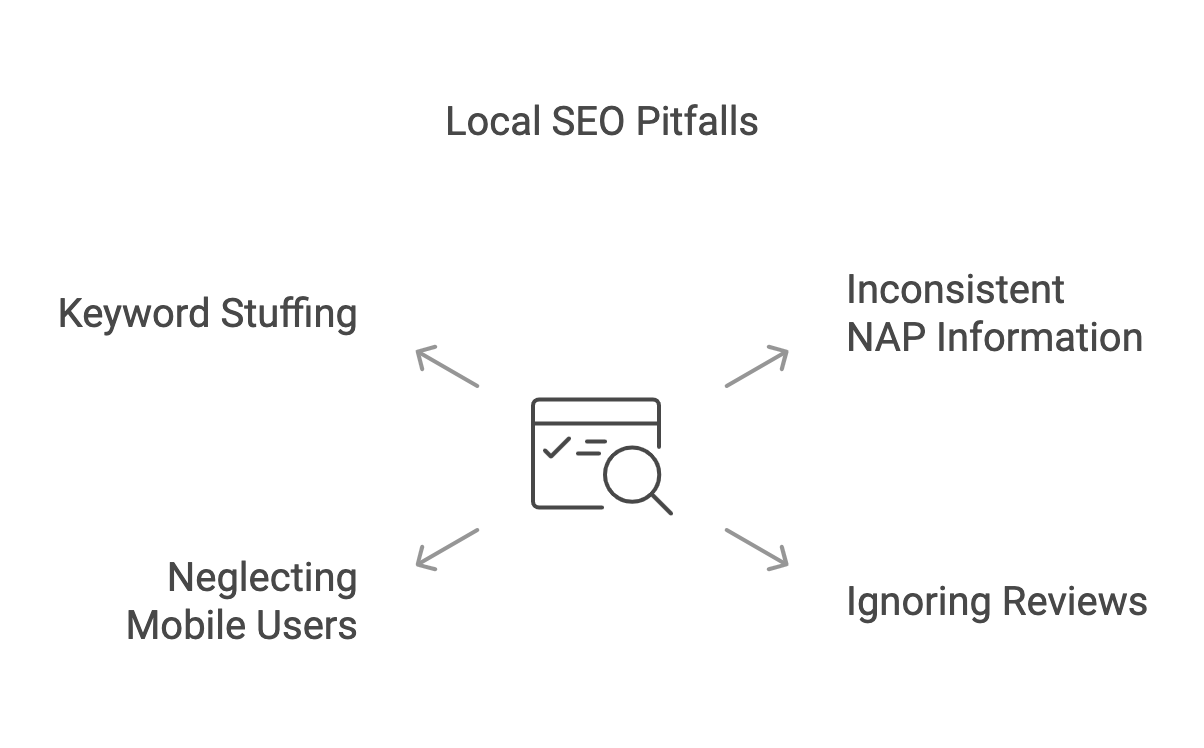In an increasingly digital world, patients rely heavily on search engines to find healthcare providers in their area. Whether locating a nearby clinic or searching for a specialist, your online presence plays a pivotal role in attracting and retaining patients. For healthcare providers, understanding and implementing local SEO strategies is not just an option—it’s essential.
This blog will explore actionable local SEO tactics tailored for healthcare professionals. By the end, you’ll have a clear roadmap to enhance your visibility online, connect with patients, and outpace competitors.
Why Local SEO Matters for Healthcare Providers
Local SEO optimizes your online presence to attract patients from your geographic area. According to studies, 77% of patients use search engines to find healthcare providers. If your practice doesn’t appear prominently in search results, you could be missing out on many potential patients.

Here’s why you need healthcare local SEO services:
- Increased Visibility: Appearing in local search results ensures that your practice is front and center when patients seek your services.
- Enhanced Patient Trust: A well-optimized online presence establishes credibility and makes it easy for patients to find you.
- Higher Conversion Rates: Local searches often lead to immediate action, such as patients booking an appointment or calling your office.
Top Local SEO Tactics for Healthcare Providers
1. Claim and Optimize Your Google Business Profile
Your Google Business Profile (GBP) is the cornerstone of your local SEO strategy. When patients search for healthcare providers nearby, your GBP listing is often the first thing they see.
Here’s how to optimize it:
- Accurate Information: Ensure your practice name, address, phone number (NAP), and hours of operation are consistent and correct.
- Categories: Choose the most relevant categories, such as “Primary Care Clinic” or “Dermatologist.”
- Photos: Upload high-quality images of your facility, staff, and services.
- Patient Reviews: Encourage satisfied patients to leave positive reviews and respond to them professionally.
Additionally, leverage the “Services” and “Products” sections in your GBP to highlight specific treatments or specialties. For example, if your clinic offers flu shots or telehealth consultations, add these details to make your profile stand out.
Pro Tip: A healthcare local SEO agency can help maintain and monitor your Google Business Profile, constantly updating and optimizing it.
2. Incorporate Location-Specific Keywords
Keywords are the backbone of your local SEO strategy. Use location-specific keywords to ensure your practice appears in searches for your area.
Examples of keywords:
- “Pediatrician in Los Angeles”
- “Orthopedic clinic near downtown Dallas”
- “Affordable dental services in Chicago”
Incorporate these keywords naturally into your:
- Website content
- Blog posts
- Meta descriptions
- Header tags (H1, H2, etc.)
For example, instead of a generic title like “Our Services,” use something more location-specific, like “Comprehensive Healthcare Services in Houston, TX.” This will make your content more relevant to both patients and search engines.
Partnering with a local healthcare SEO agency can help you identify the most effective keywords for your practice and rank higher in local searches.
3. Build Citations and Directory Listings
Citations are mentions of your practice’s NAP information on external websites. Accurate and consistent citations across reputable directories can boost your local SEO rankings.
Key directories for healthcare providers include:
- Healthgrades: Trusted by patients searching for doctors and specialists.
- Zocdoc: Ideal for booking appointments and showcasing patient reviews.
- WebMD: A popular resource for health-related queries.
- Yelp: A widely-used platform for finding local businesses.
- Local Chambers of Commerce or Business Associations: Builds trust and connects you to the community.
Inconsistent or outdated information in these directories can harm your credibility and confuse search engines. Therefore, it is essential to maintain accuracy through regular audits.
Tip: Manage citations using tools like Moz Local or BrightLocal, or rely on healthcare local SEO services for expert assistance.
4. Create Location-Based Content
Developing content that caters to your local audience is a powerful way to enhance your SEO efforts. This includes blog posts, landing pages, and service pages tailored to specific geographic areas.
Examples:
- Blog topics like:
- “Top 5 Clinics for Allergy Testing in Miami”
- “10 Common Flu Symptoms and Where to Get Treated in Phoenix”
- Location-specific landing pages, such as:
- “Urgent Care in Downtown San Diego”
- “Physical Therapy Services in Orlando, FL”
Engaging and informative local content establishes your expertise and relevance in the community. Additionally, consider featuring community events or health initiatives your practice participates in, which can further strengthen local connections.
5. Optimize for Mobile Users
Most patients search for healthcare providers on their smartphones. 76% of people who search for something nearby on their mobile device visit a business within a day.
To cater to mobile users:
- Ensure your website is mobile-responsive.
- Use fast-loading pages (target a load time of under 3 seconds).
- Simplify navigation for mobile screens.
- Include clickable phone numbers and a user-friendly appointment booking form.
A mobile-optimized website improves user experience and enhances your ranking in local search results.
6. Leverage Online Patient Reviews
Patient reviews are a critical ranking factor for local SEO. Favorable reviews increase your credibility and attract more patients.
How to collect and manage reviews:
- Ask for Feedback: Encourage patients to leave reviews on Google, Yelp, or healthcare-specific platforms like Healthgrades.
- Respond to Reviews: Thank patients for positive feedback and address concerns professionally in negative reviews.
- Use Review Widgets: Display reviews prominently on your website.
Negative reviews, while challenging, can be an opportunity to show professionalism by resolving issues. Address complaints promptly and work to improve patient experiences.
Pro Tip: Consider engaging a healthcare local SEO agency to streamline the review management process and monitor your online reputation.
7. Use Local Schema Markup
Schema markup is structured data that helps search engines understand your website’s content. By using local schema, you can enhance your local search visibility.
Example schema types for healthcare:
- Medical Organization Schema: Provides information about your practice.
- Physician schema: Highlights individual practitioners and their specialties.
- Local Business schema: Includes your address, phone number, and operating hours.
Schema markup allows search engines to display rich snippets, such as star ratings and office hours, directly in search results, improving click-through rates.
8. Implement Geo-Targeted Ads
While organic SEO is vital, combining it with geo-targeted paid ads can give your practice a competitive edge. Platforms like Google Ads and Facebook allow you to target ads to specific locations, ensuring they reach the right audience.
Best practices for geo-targeted ads:
- Use location-specific keywords in your ad copy.
- Include a call-to-action (e.g., “Schedule Your Appointment Today!”).
- Monitor ad performance and adjust targeting based on results.
Paid ads can drive immediate results while your organic SEO efforts gain traction.
9. Monitor and Analyze Local SEO Performance
Track your progress using analytics tools to ensure your local SEO efforts are effective. Key metrics to monitor include:
- Search rankings for local keywords
- Website traffic from local searches
- Conversion rates (appointment bookings, phone calls, etc.)
Google Analytics and Google Search Console are invaluable tools for monitoring your performance. Regular audits help you identify gaps and refine your strategy.
Avoid Common Local SEO Mistakes
While implementing local SEO tactics, be mindful of these common pitfalls:

- Inconsistent NAP Information: Discrepancies in your name, address, and phone number across platforms can confuse search engines and patients.
- Ignoring Reviews: Unaddressed negative reviews can harm your reputation.
- Neglecting Mobile Users: Failing to optimize for mobile can result in lost patient inquiries.
- Keyword Stuffing: Overusing keywords can make your content appear spammy.
Partnering with experts in local SEO for healthcare professionals ensures your strategy avoids these mistakes and follows best practices.
Frequently Asked Questions (FAQs) About Local SEO for Healthcare Providers
Here are answers to some commonly asked questions to help you better understand local SEO and how it can benefit your practice. These questions focus on the commercial and transactional keywords you may encounter while exploring local SEO solutions for healthcare.
1. What are local healthcare SEO services?
Healthcare local SEO services refer to specialized solutions designed to optimize a healthcare provider’s online presence for local search results. These services include strategies such as improving your Google Business Profile, managing online reviews, optimizing website content for location-specific keywords, and building citations in healthcare directories like Healthgrades and Zocdoc.
Why it matters:
Healthcare local SEO services ensure your practice appears in local searches, attracts more patients, and increases appointment bookings.
2. How Can a Healthcare Local SEO Agency Help My Practice?
A healthcare local SEO agency provides expertise in implementing and managing strategies tailored for medical practices. These agencies handle everything from keyword research and citation management to creating geo-targeted content and monitoring your online reputation.
Key benefits include:
- Improved local search rankings
- Increased website traffic and patient inquiries
- Expert handling of technical SEO elements like schema markup
Outsourcing to an agency saves time and ensures your local SEO efforts are aligned with industry best practices.
3. Why Is Local SEO Important for Healthcare Professionals?
Local SEO ensures that patients in your area can easily find your practice online. For healthcare professionals, this means more visibility, higher patient trust, and increased appointment bookings.
Key reasons to prioritize local SEO include:
- Higher Conversion Rates: Local searches often result in immediate action, such as booking an appointment.
- Targeted Marketing: Local SEO focuses on reaching patients near your location who are actively searching for your services.
- Competitive Advantage: Effective local SEO helps you rank higher than competing practices in search results.
4. What Are the Costs of Healthcare Local SEO Services?
The cost of healthcare local SEO services can vary based on the size of your practice, the scope of services required, and the provider’s expertise. Typically, pricing ranges from $500 to $2,500 per month for comprehensive solutions.
Factors influencing costs include:
- The number of locations or service areas
- Whether you need ongoing management or a one-time setup
- Advanced features like paid ads or detailed analytics
Pro Tip: Investing in a reputable healthcare local SEO agency can deliver a high return on investment by attracting more patients and increasing revenue.
5. Can Local SEO Help Me Compete with Larger Healthcare Chains?
Absolutely! Local SEO levels the playing field by focusing on geographic proximity and relevance rather than the size of your practice. With the correct local SEO for healthcare professionals, your independent clinic can appear prominently in local search results, even when competing against larger healthcare chains.
Key strategies include:
- Highlighting patient reviews to showcase your quality of care.
- Optimizing your website for specific neighborhoods or communities.
- Engaging with local events or partnerships to build credibility.
6. How Long Does It Take to See Results from Local SEO?
Local SEO is a long-term strategy, and results often depend on factors such as your starting point, competition in your area, and the plan implemented. While you may see improvements in rankings within 2-3 months, significant results (e.g., increased patient inquiries and bookings) typically take 6-12 months.
To speed up results:
- Keep your Google Business Profile active by updating it regularly.
- Focus on generating patient reviews.
- Partner with a local healthcare SEO agency to avoid common mistakes and maintain consistent progress.
7. Do I Need a Healthcare-Specific SEO Strategy?
Yes, healthcare practices have unique needs requiring a specialized SEO SEO approach. A generic strategy may miss critical aspects, such as complying with medical advertising guidelines, targeting healthcare directories, or addressing patient trust concerns.
A healthcare-specific strategy includes:
- Incorporating medical keywords (e.g., “urgent care in Denver” or “cardiologist near me”).
- Ensuring HIPAA-compliant content and forms.
- Optimizing for health-related platforms like WebMD and Healthgrades.
8. What Are Geo-Targeted Keywords, and How Do They Work?
Geo-targeted keywords combine your services with specific locations to target local patients effectively. Examples include:
- “Family doctor in Austin, TX”
- “Dental clinic near Central Park”
- “Pediatrics in Brooklyn Heights”
Why they work:
Search engines use these keywords to connect your practice with patients searching for services in your area, making them essential for local SEO success.
9. How Can I Monitor My Local SEO Progress?
Tracking your local SEO performance helps you identify what’s working and where to improve. Key tools to monitor progress include:
- Google Analytics: This is used to track website traffic and user behavior.
- Google Search Console: To identify keyword rankings and search performance.
- Local SEO Tools: Platforms like BrightLocal or Moz for tracking citations, reviews, and local rankings.
By partnering with a healthcare local SEO agency, you can receive detailed reports and actionable insights without spending time managing the data yourself.
10. Can Local SEO Help Drive Walk-In Patients?
Yes! Local SEO is particularly effective in driving walk-in patients by increasing your visibility in “near me” searches. For instance, if a patient searches for a “walk-in clinic near me,” a well-optimized local SEO strategy ensures your practice appears at the top of the results.
To enhance walk-in traffic:
- Highlight “walk-in availability” or “same-day appointments” in your Google Business Profile.
- Use location-based keywords prominently on your website.
- Encourage satisfied walk-in patients to leave reviews.
Ready to boost your online presence
Implementing effective local SEO strategies can transform your online visibility, helping you connect with more patients and grow your practice. Every tactic contributes to a more substantial local presence, from optimizing your Google Business Profile to managing patient reviews and creating location-specific content.
If you’re ready to elevate your practice, consider partnering with a healthcare local SEO agency. Their expertise can save you time, ensure best practices, and deliver measurable results.
Explore Karma Health’s comprehensive healthcare local SEO services to attract more patients and stay ahead of the competition. Contact us today for a free consultation!




